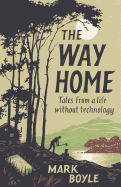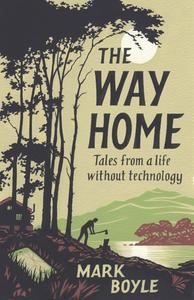
 Mark Boyle was The Moneyless Man in his memoir of that title, about the first of three years he spent living without money. The Way Home: Tales from a Life Without Technology covers another first year: Boyle has now made the shift to a life without modern technology in County Galway, Ireland. What is modern technology? Obviously, definitions are complicated, but for Boyle his new way of living means hauling his own water; fishing, foraging and gardening for his food; making his own beer and wine; and traveling by bicycle, by hitchhiking and on foot. (He beats himself up about monofilament fishing line but, within the book's timeline, has not yet found an alternative.)
Mark Boyle was The Moneyless Man in his memoir of that title, about the first of three years he spent living without money. The Way Home: Tales from a Life Without Technology covers another first year: Boyle has now made the shift to a life without modern technology in County Galway, Ireland. What is modern technology? Obviously, definitions are complicated, but for Boyle his new way of living means hauling his own water; fishing, foraging and gardening for his food; making his own beer and wine; and traveling by bicycle, by hitchhiking and on foot. (He beats himself up about monofilament fishing line but, within the book's timeline, has not yet found an alternative.)
Organized as the diary of a year in its four seasons, The Way Home is a thoughtful study, often wise but always questioning and seeking. With frequent references to Edward Abbey, John Muir, Aldo Leopold, Robert Macfarlane, Wendell Berry, Henry David Thoreau and others, Boyle places himself in a grand tradition of intellectual naturalists and thinkers. He also makes repeated forays (both literally and in imagination and research) to Great Blasket Island, an unusually literary place where a technology-free lifestyle only recently ended. He aims to query every decision, investigate its outcomes: while writing this book using a pencil, he stops to consider the making of that tool--its wood and graphite and paint, the extraction of these materials and the transportation of the workers who made it. Boyle, stymied by the ecological impact of such a simple technology as a pencil, is a former vegan who now eats fish and venison. He is a man willing to rethink his outlook.
Boyle has a sense of humor as well as a deep sensitivity to the needs of people as well as the planet and its ecosystems. "Rome," he reflects, "wasn't demolished in a day," as he gardens with the (plastic) tools available and plans for the future. His writing style is pensive and unhurried. His lifestyle is in many ways "slow," as in slow food and slow transportation, and he observes that writing by hand after a longtime addiction to computers has slowed his thought processes, for the better. "Just as carpenters always recommend measuring twice and cutting once, I've begun thinking twice and writing once."
The result is a deeply appealing examination of nearly all aspects of modern human life, by a thorough, careful, concerned narrator. Readers already considering various forms of disconnection from modern technologies--in favor of a reconnection with local plants, animals, soil and people--will be goaded and inspired. Those less attracted to composting their own feces will nonetheless be entranced by Boyle's unusual lifestyle, and perhaps moved a little closer to the earth. --Julia Kastner, librarian and blogger at pagesofjulia
Shelf Talker: This memoir about living off the grid and tech-free in County Galway will inspire, connect and slow down the most impatient of readers, and that is a very good thing.

